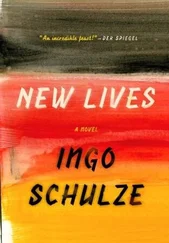I sat directly across from Elvira, the perfect spot for observation, so to speak. She was wearing lipstick plus a little eye shadow. A narrow stripe of untanned skin was noticeable at the top of each arm.
In Boris’s presence you quickly get the sense that you’re witty and articulate, because he takes almost every remark as his cue for a story or at least replies with a burst of laughter that encourages you to continue.
That evening he evidently needed some encouragement himself, otherwise he would not have thanked Pavel so profusely for the music and uncorking the bottle of wine. Several times he asked, “Well, enjoying your food?” although everyone had already praised his cooking.
It was mainly Pavel’s questions that gradually helped Boris hit his stride. “There’s a story,” he suggested, “behind every square meter here.” By which, to be brief, he meant the hassles he’d had with drywallers, electricians, tile layers, painters. I had already been informed about a good half of these squabbles.
During the main course of fish — the supermarket kitty-corner had a fantastic fish counter — Boris described how over the last three weeks, because he had to be out of his old apartment, he had tried spurring the workers on with fifty-euro bills, but nothing helped. They hadn’t been paid by the general contractor, and so they simply stopped showing up for work. Boris, as I knew him, was a born storyteller — according to Susanne, a windbag. When he got to the part about the stolen window handles he’d had to replace, he gave a wide-sweeping gesture with one arm that signaled he was winding down again. He paid no more attention to Elvira than to Susanne and me, since we were not providing him any cues to pick up on.
Unlike Susanne I’m not uncomfortable in such surroundings. Susanne always claims I’m a harmony freak, and that what I see as arguments are really quite normal discussions. And I admit it — lately I like it better if people don’t argue. We, by which I mean our circle of friends, of acquaintances, used to strike a different tone with one another. Not that we were always of the same mind. Of course we each found various things to be good or important, but there was never anything fundamental, let alone personal, about it — even if someone believed in God or in the party and someone else didn’t. But that’s in the past, at the very latest since the Kosovo war or since Afghanistan. I thought there might be some improvement once everybody could see where the Iraq war has gotten us. Except for Susanne no one knows how I vote. And she just thinks I’ve got a screw loose. I don’t mean to say that friendships have been ruined over it, but they’re not like they once were. You first stop and think about what you will or won’t say.
Until we got up from the table and distributed ourselves over the four-seaters, nothing much happened worth telling about. I might say that over the course of the meal I got used to Elvira, yes, even found her pretty in some way, and that my eyes returned again and again to those narrow pale stripes at the top of her arms. Thus far I hadn’t heard her say a word, except for “Thanks a lot” and “More fish?”—phrases that betrayed her uncertainty as to whether to use formal or informal pronouns. Elvira had helped Boris serve and clear the table, something forbidden his guests. We were to amuse ourselves, which we managed only with difficulty without him.
Once we had transplanted ourselves to new seating arrangements, our general self-consciousness returned. It was as if we had taken seats to hear a lecture or see a movie. Pavel had selected the music — early Pink Floyd stuff that everybody knows, but that can leave you drowsy and down.
Susanne, however, had made a beeline to secure herself a spot near the window in the middle of the four-seater, but then slid over a little to let Pavel and Ines join her, and had sent me away again, so that when Elvira finally appeared with pretzel sticks, hazelnuts, and raisins, she had to end up beside her — unless Elvira went to the trouble of pushing another chair closer. And like a trap snapping shut, Susanne began to draw Elvira into conversation. I admire the way Susanne handles such situations, especially because she can make it all look quite coincidental.
At first Elvira sat up ramrod straight, holding a bundle of pretzel sticks in one hand and fixing her eyes on Susanne like a deaf-mute. Her face slowly took on life, and when she smiled she would close her light brown eyes as if reveling in a lovely dream. Soon they were facing each other, their knees almost touching.
It seemed to me that the rest of us were talking just so these two women could converse without interruption. Boris obliged us with another tile-laying story. He had come home about ten in the evening, only to discover what a mess had been made of the job, climbed into his car, and roused the tile layer from his bed, “to save what could be saved, while you could still pry the tiles loose!” And he flung his arm wide again. “It sounds crazy, but you’re better off doing it yourself.”
“Or don’t let them out of your sight for a minute,” Lore said. She and Fred smiled at each other — you might have taken them for brother and sister. Lore’s black hair was shorter than his and sprinkled with tiny icicles. His wiglike ponytail and his gap teeth gave him an antiquated look. (One of Susanne’s coworkers at her agency has actually hired Fred to play a role in a medieval pageant in Frankfurt on the Oder.)
As she spoke Susanne gazed straight ahead, balancing her wineglass on her knee with just two fingers. Elvira went on holding her bundle of stick pretzels clamped in her hand, without eating a one.
“It can happen,” Pavel said.
“Sure can,” Boris said. He wiped the sweat from his brow with his forearm, leaving the little hairs at his wrist pasted against the skin.
Once Elvira noticed that everyone else had fallen silent, she spoke even more softly. No one except Boris, who was sitting closest to her, knew why Susanne suddenly threw her head back and put her hand to her mouth.
“Can we laugh along with you?” Pavel asked.
“Of course, go ahead,” Boris said, and walked to the balcony door. He opened the Venetian blinds and pulled them up, but so out of whack that they drooped on the right like a fan. Elvira went on speaking softly.
“May I?” Pavel asked and held the bottle up. Elvira nodded. But she didn’t have a glass. There were several volunteers, including myself, who offered to fetch one from the kitchen. Lore won the contest. Pavel stood smiling in front of Elvira and Susanne.
“He wants to laugh along,” Boris said as he tried to adjust the blinds to horizontal. “You’ve finally managed it. Now everybody wants to lend an ear.”
“Oh leave her be!” Susanne exclaimed.
When Lore appeared with the wineglass, Pavel carefully lowered the neck of the bottle to the edge of the glass and poured. “I don’t drink red wine,” Elvira said, never budging. Pavel apologized, took the glass from her hand, and went back to the kitchen.
“So now you’ll all be treated to a fine story,” Boris said. “Something very special.”
“She did tell it so well,” Susanne said, as if that was the end of it.
Elvira seemed to be reconsidering her vanished glass. I was sure she would refuse to tell her story again on command. But then she said, “Well, okay,” laid her bundle of pretzel sticks on the table, and rubbed her hands together. “I’ll start over again.”
“Once more from the top,” Boris scoffed as he tipped the window open and then returned to his seat. “Everybody’s just wild to hear you tell it.”
“I thought,” Elvira said, “that if I’m going to live here I ought to do my part—”
Читать дальше












